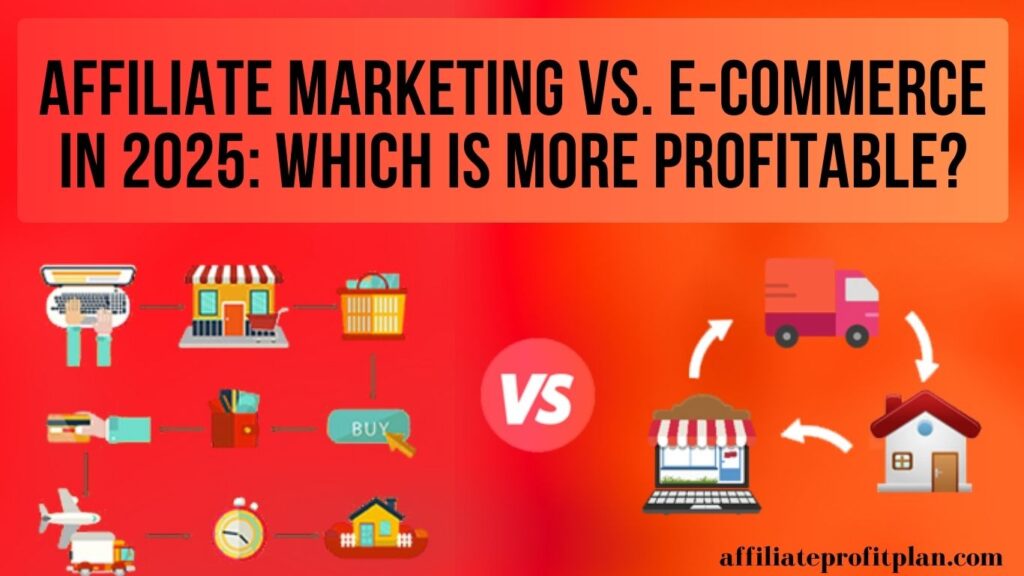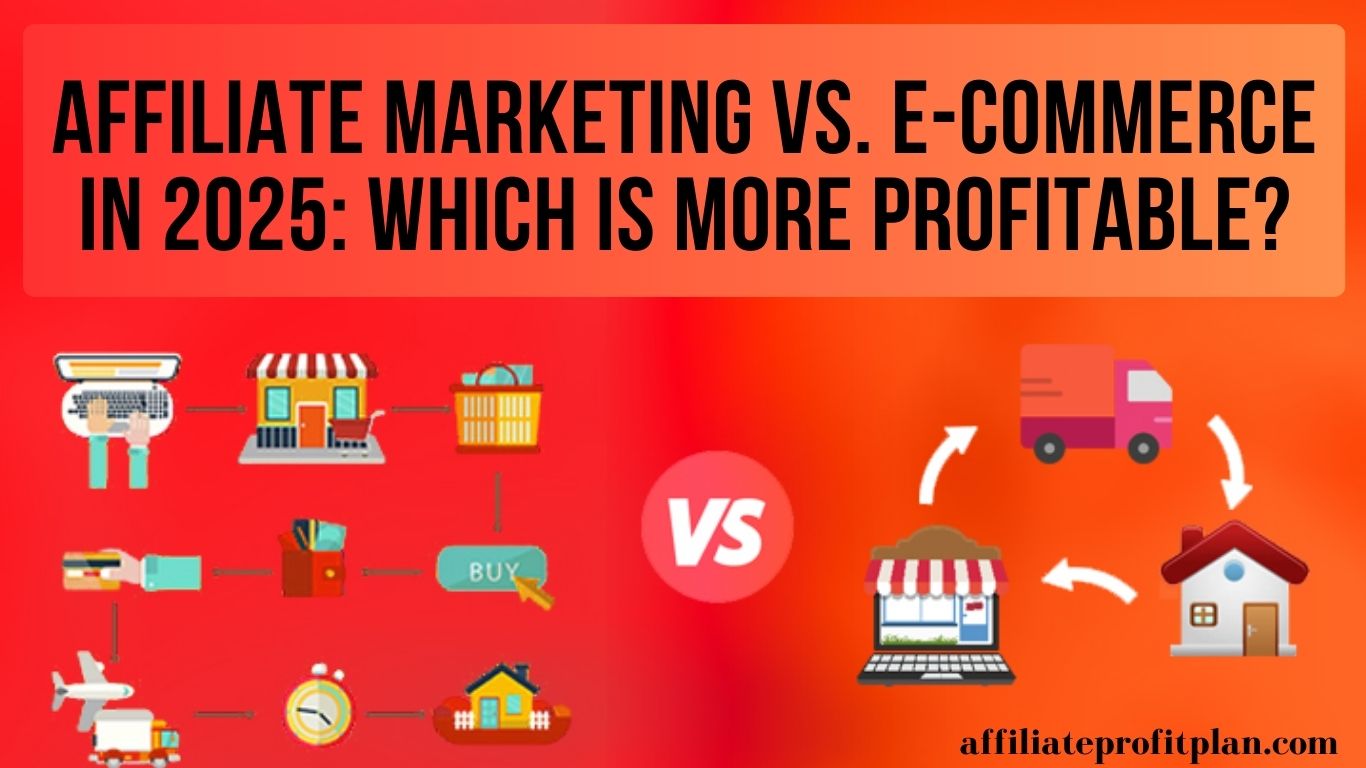Welcome to my article Affiliate Marketing vs. E-Commerce in 2025: Which Is More Profitable? In the sprawling world of online business, two titans reign supreme: affiliate marketing and e-commerce. If these terms sound like buzzwords thrown around by internet gurus in flashy ads, you’re not entirely wrong. But they also represent two of the most lucrative ways to make money online, with billions of dollars up for grabs every year. As we step into 2025, the big question remains: which path is more profitable? Spoiler alert—there’s no one-size-fits-all answer, but we’re here to help you figure it out.
In this blog, we’ll dive into the profitability potential of both models, comparing their setup costs, scalability, and long-term growth prospects. Whether you’re a side hustler, a digital nomad, or just someone hoping to pay off their coffee addiction, this guide will help you decide where to put your time and energy in 2025. So, grab your metaphorical money-making magnifying glass, and let’s investigate which of these paths can fill your wallet faster!
Access My Proven Blueprint for $50-$100 Daily Income – Watch This FREE Video Now >>>

Understanding Affiliate Marketing and E-Commerce
Before we pit affiliate marketing and e-commerce against each other in the ultimate showdown, let’s make sure we understand what these two money-making giants are all about. Think of it as learning the fighters’ backstories before the big match—because context is everything.
What is Affiliate Marketing?
Affiliate marketing is like being a matchmaker in the business world. Your job is to connect people (customers) with their perfect product match, and if they say “I do” by clicking “Buy Now,” you get a commission. The beauty of affiliate marketing lies in its simplicity: no inventory, no shipping headaches, and no awkward customer service calls.
For example, you could create a blog reviewing the best noise-canceling headphones. If a reader clicks your affiliate link and buys a pair, cha-ching—you’ve just earned a commission without lifting a box or dealing with a single return request. However, you’re also at the mercy of the company you’re promoting. If they decide to slash commissions or discontinue their affiliate program, your income stream could dry up faster than your motivation on a Monday morning.
What is E-Commerce?
E-commerce, on the other hand, is the digital equivalent of opening your own store. But instead of folding clothes in a brick-and-mortar shop, you’re managing products on Shopify or Amazon, taking orders, and making customers happy from behind your screen. You have control over what you sell, how you brand your store, and how much profit you want to make.
Sounds glamorous, right? Well, it’s not all sunshine and sales. Unlike affiliate marketing, e-commerce requires upfront investment—think inventory costs, website hosting, and possibly hiring someone to fix that weird “404 Error” on your checkout page. Plus, managing logistics can feel like playing Tetris with boxes and shipping labels.
The Key Difference
Affiliate marketing is all about promoting someone else’s products, while e-commerce is about selling your own. One is like renting a car, and the other is buying one outright. Both can get you where you want to go, but they require different levels of commitment, investment, and—let’s be honest—emotional energy.
Now that we’ve laid the groundwork, let’s dive into which of these two contenders is more profitable in 2025. Spoiler alert: it depends on how you want to play the game!
Profitability Potential in 2025
When it comes to profitability in 2025, both affiliate marketing and e-commerce are lucrative, but they play the game differently. It’s like comparing a sprinter to a marathon runner—both are athletes, but their strategies (and rewards) vary. Let’s break down how each business model stacks up in the money-making department this year.
Affiliate Marketing: The Passive Income Dream
Affiliate marketing thrives on the concept of “work once, earn forever” (or at least for a while). You create content—blogs, videos, or social media posts—that promotes a product. Once your audience clicks those affiliate links and makes a purchase, you earn a commission. The trick is to focus on high-ticket items or trending niches that promise higher payouts, like AI tools, online courses, or luxury gadgets.
In 2025, the affiliate marketing landscape is more competitive than ever, but it’s also more rewarding. With a growing number of companies investing in affiliate programs, the earning potential is significant. However, your income is tied to factors you can’t control, like commission rates and product availability. If a company decides to lower its payout or discontinue a product, your profits might take a hit faster than you can say “algorithm update.”
E-Commerce: Building Your Own Empire
E-commerce, meanwhile, lets you take full control of your profitability. Selling your own products—whether it’s physical goods, digital downloads, or even dropshipped items—means you’re not splitting the profits with anyone. Plus, as e-commerce continues its upward trajectory in 2025 (hello, $7 trillion market size!), opportunities abound for entrepreneurs.
The real goldmine lies in niche products that cater to specific audiences. Think eco-friendly gadgets, personalized gifts, or subscription boxes for hyper-specific hobbies. By controlling your pricing, branding, and marketing, you have the potential to scale your income to six or seven figures. However, e-commerce isn’t without its costs. Inventory, advertising, and operational headaches can eat into your margins, leaving you wondering if the effort is worth the reward.
The Verdict: It’s a Tie (Sort of)
Affiliate marketing wins in terms of low upfront costs and passive income potential. If you can consistently drive traffic and conversions, it’s a great way to earn without the hassle of running a store. On the other hand, e-commerce offers greater control and scalability, making it ideal for those willing to invest time, money, and effort into building a brand.
In 2025, your profitability depends on your strategy and goals. Want to make quick commissions? Affiliate marketing is your jam. Looking to build a long-term business empire? E-commerce is your ticket. Either way, the opportunities are endless—if you’re ready to seize them.
Investment and Setup Costs
Let’s talk about money—specifically, how much you’ll need to cough up to get started with affiliate marketing or e-commerce. Spoiler: affiliate marketing is the frugal friend who insists on splitting the bill evenly, while e-commerce is the big spender who orders appetizers for the whole table. Both have their merits, but your budget might be the deciding factor in choosing your path.
Access My Proven Blueprint for $50-$100 Daily Income – Watch This FREE Video Now >>>
Affiliate Marketing: The Budget-Friendly Hustle
If you’re looking for a low-cost entry point into the online business world, affiliate marketing is the way to go. To get started, all you really need is:
- A website or blog (basic hosting costs can be as low as $5/month).
- Content creation tools (free options like Canva or slightly pricier ones like Adobe).
- An email marketing platform (many offer free plans for beginners).
And voilà—you’re ready to dive into promoting products! The biggest investment here is your time. You’ll need to learn skills like SEO, copywriting, and how to drive traffic to your content. Optional costs like paid ads can speed things up but aren’t mandatory. All in all, you can get started with affiliate marketing for under $100 if you’re scrappy.
E-Commerce: The Bigger Initial Commitment
E-commerce, on the other hand, requires more upfront cash. Here’s a quick breakdown of common expenses:
- Website Setup: Hosting, a domain, and a platform like Shopify or WooCommerce can run you $30–$100/month.
- Inventory Costs: If you’re selling physical products, you’ll need to purchase stock upfront—this can range from a few hundred to thousands of dollars. Dropshipping? You’ll save on inventory but may still face higher product costs per unit.
- Marketing and Ads: Effective e-commerce often relies on paid ads, with budgets starting at $300/month for decent results.
- Other Tools: Payment processing fees, email marketing, and analytics tools can add up.
Starting an e-commerce store can easily set you back $1,000 or more, depending on your business model and how fancy you want your setup to be.
The Hidden Costs
It’s not just about the money; time is an investment too. Affiliate marketing requires a lot of upfront work—creating content, building an audience, and waiting for those commissions to roll in. E-commerce demands time for product sourcing, customer service, and dealing with inevitable hiccups like shipping delays or refunds.
So, Which One Wins?
Affiliate marketing is the clear winner if you’re on a tight budget or just dipping your toes into the online business pool. But if you have the funds and a vision for building a brand, e-commerce offers higher potential returns—at the cost of higher initial investment.
Whether you’re pinching pennies or ready to splurge, understanding these costs upfront will save you from nasty surprises down the road. After all, the only thing worse than overspending is realizing you’ve accidentally invested in a product nobody wants—like that time you bought fidget spinners in 2023 hoping for a comeback.
Scalability and Long-Term Growth
When it comes to building an online empire, scalability and long-term growth are the holy grails. You want a business model that can grow with you—preferably without breaking your back or your bank account. Both affiliate marketing and e-commerce offer potential for massive growth, but they take different routes to get there. Let’s see how they stack up.
Affiliate Marketing: The Slow and Steady Climber
Affiliate marketing is like planting a garden. You sow the seeds by creating high-quality content and nurturing your audience, and over time, your efforts bloom into steady commissions. The beauty here is that affiliate marketing scales with traffic. Got 10,000 monthly readers on your blog? Great! Turn that into 100,000, and your earnings multiply.
But scalability isn’t entirely in your hands. You’re still tied to the products and programs you promote. If a brand cuts commissions or discontinues a product, your income can take a hit. Plus, you’ll need to continuously adapt to algorithm changes (thanks, Google) and keep your content fresh. Long-term growth in affiliate marketing demands consistent effort, but it rewards you with a relatively hands-off income once the ball is rolling.
E-Commerce: Sky’s the Limit (If You’re Ready to Hustle)
E-commerce is the ambitious entrepreneur’s playground. Unlike affiliate marketing, where your earning potential is capped by commission rates, e-commerce gives you control over pricing, branding, and scaling. Want to expand your product line? Easy. Thinking about targeting a new market? Go for it.
The catch? Scaling an e-commerce business requires more than just ambition—it takes capital, operational savvy, and a knack for juggling tasks. Growth often means hiring staff, outsourcing logistics, or investing heavily in advertising. But the upside is massive: a well-run e-commerce store can generate six- or seven-figure revenues, and with automation tools, much of the workload can be streamlined.
Challenges of Scaling
- Affiliate Marketing: Growth hinges on traffic, and building a loyal audience takes time. Expanding into new niches or diversifying your affiliate programs can mitigate risks, but it’s not an overnight process.
- E-Commerce: Scaling often introduces complexity—inventory management, supply chain issues, and customer service demands increase with growth. You’ll need systems in place to handle higher order volumes and avoid turning your dream business into a logistical nightmare.
The Long Game
Affiliate marketing shines for those who prefer a hands-off approach. Once your content ranks well and your links generate steady clicks, you can enjoy a relatively passive income stream for years. However, staying relevant requires periodic updates and attention to industry trends.
E-commerce, by contrast, offers unlimited growth potential for those willing to put in the work. With a strong brand and customer base, you can expand into new product lines, explore wholesale opportunities, or even sell your business for a handsome profit. It’s a more hands-on journey but one with potentially massive payoffs.
Which Path is Right for You?
If you dream of a business that quietly earns while you sip margaritas on a beach, affiliate marketing might be your soulmate. But if you’re ready to hustle, innovate, and take risks for higher rewards, e-commerce offers the kind of long-term growth that could have you sipping champagne in your private jet (or at least upgrading from coach).
Scalability comes down to your goals and grit. Whether you’re building a content empire or the next big online store, both models have the potential to grow with you—just make sure you’re ready to grow with them.
Which Model Is Right for You?
Deciding between affiliate marketing and e-commerce is like choosing between a comfy pair of sneakers and a flashy pair of heels—both have their perks, but the best fit depends on your needs, goals, and willingness to hustle. Let’s break it down so you can pick the model that matches your style (and stamina).
Affiliate Marketing: The Low-Key Hustler’s Paradise
Affiliate marketing is perfect for those who prefer a lightweight, low-maintenance approach to making money online. If any of these sound like you, affiliate marketing might be your jam:
- You’re a content whiz: If you love writing blogs, creating videos, or growing your social media following, affiliate marketing fits seamlessly into your workflow.
- You’re on a budget: With minimal upfront costs, affiliate marketing is great for anyone who wants to start earning without a huge financial risk.
- You dream of passive income: The idea of doing the work upfront (creating content, optimizing for SEO) and letting the money roll in sounds like the ultimate win.
That said, affiliate marketing isn’t all rainbows and dollar signs. It takes time to build traffic and trust. Plus, you’re dependent on third-party programs, which means you’ll need to stay adaptable if commission rates or product offerings change.
E-Commerce: The Go-Big-Or-Go-Home Approach
E-commerce is for the bold, the brave, and the business-savvy. Here’s how to know if this model is your perfect match:
- You want full control: From pricing to branding, e-commerce lets you call the shots. If you’re a creative visionary with a knack for strategy, this is your playground.
- You’re ready to invest: Whether it’s time, money, or brainpower, e-commerce demands a bigger commitment upfront. If you have the resources and drive, the returns can be massive.
- You’re a problem solver: Scaling an e-commerce business comes with challenges like managing inventory, dealing with suppliers, and handling customer service. If you thrive under pressure, this model rewards your effort.
However, e-commerce isn’t without its risks. Upfront costs can add up, and there’s always the chance of inventory sitting unsold or a competitor undercutting your prices. It’s a high-stakes game, but one with potentially huge rewards.
Hybrid Hustler? Why Not Both?
Who says you have to pick just one? In 2025, many entrepreneurs are combining affiliate marketing and e-commerce to diversify their income streams. For example:
- Use affiliate marketing to test demand for a niche before launching your own products.
- Run an e-commerce store and use affiliate links to recommend complementary products you don’t sell yourself.
The hybrid approach lets you hedge your bets and maximize profitability, but it also doubles your workload.
Making the Choice
Ultimately, the right model depends on your personality, goals, and resources. If you’re looking for flexibility and a low-stress entry point, affiliate marketing is the way to go. But if you’re ready to build a brand and take ownership of your business, e-commerce offers the chance to scale to new heights.
Remember, there’s no wrong choice—only the one that aligns with your strengths and ambitions. And hey, if all else fails, you can always pivot. After all, the online world in 2025 is nothing if not full of opportunities for reinvention.
Conclusion
So, here we are—the finish line of the great “Affiliate Marketing vs. E-Commerce in 2025” debate. By now, you’ve probably realized that there’s no one-size-fits-all answer to which model is more profitable. It all comes down to you—your goals, resources, and how much caffeine you’re willing to consume in the name of online success.
Access My Proven Blueprint for $50-$100 Daily Income – Watch This FREE Video Now >>>
Affiliate Marketing: The Chill Hustle
If you’re all about low upfront costs, flexible schedules, and earning while you binge-watch your favorite shows, affiliate marketing might be your soulmate. It’s the perfect choice for those who prefer leveraging content and strategy over inventory and logistics. Sure, it’s a slow burn at first, but once your content gains traction, it can turn into a steady stream of (mostly) passive income.
E-Commerce: The Power Play
On the flip side, e-commerce is for the go-getters who dream big and don’t mind rolling up their sleeves to make it happen. It’s a more hands-on, risk-heavy venture, but the rewards can be astronomical if you nail your niche, branding, and operations. From building a loyal customer base to creating a scalable empire, e-commerce gives you the control and potential to go far—if you’re ready to invest the effort (and dollars).
What’s the Real Winner?
Honestly, the winner here isn’t affiliate marketing or e-commerce—it’s you, the savvy entrepreneur who’s willing to dive into the digital world and make it work. Whether you pick one model, try both, or start with one and pivot later, the important thing is to take action. The online business landscape in 2025 is brimming with opportunities, and the only way to find out what works is to get started.
Final Word of Advice
The best model is the one that aligns with your strengths and long-term vision. So, take a deep breath, grab that metaphorical sword (or laptop), and charge into the world of affiliate marketing or e-commerce—or both. Who knows? A year from now, you might be the one writing a blog about how you built your online empire. And when that happens, don’t forget to link back to this article. It’s only fair, right? 😉
Thanks a lot for reading my article on “Affiliate Marketing vs. E-Commerce in 2025: Which Is More Profitable?” till the end. Hope you’ve helped. See you with another article.










